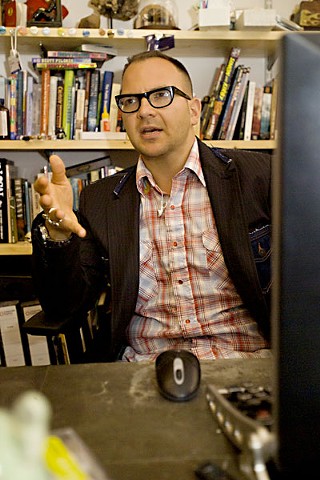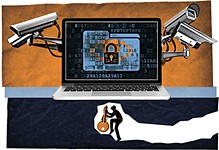Invaluable Information
Technology, privacy, hacking, and legislating in the new digital age
By Jon Lebkowsky, Fri., March 8, 2013
On the one hand information wants to be expensive, because it's so valuable. The right information in the right place just changes your life. On the other hand, information wants to be free, because the cost of getting it out is getting lower and lower all the time. So you have these two fighting against each other.
– Stewart Brand
Most of us take the Internet for granted; it's something we don't have to understand. "Our lives are complex enough," we think. "Hide the infrastructure, and spare us the details." With technology, we're like the blind men and the elephant: We know only what we experience, and we don't try to learn more about it. But for others, technology comes naturally; it's an extension of their selves. We call those people "hackers," a broad term defined by context, but generally taken to mean a digital wizard who really gets the technology, has proficiency, and knows how to use it, for good or ill.
Aaron Swartz was one of those guys, a white-hat hacker, and he was a prodigy, a very young guy with a deep grasp of the technical infrastructure of cyberspace. As a precocious teen, he already understood Internet technology and many of its best uses, especially the dramatic potential for sharing knowledge in powerful ways. He contributed to the sharing of Web content by improving on the protocols for the open syndication of content through published feeds.
An idealist, he couldn't understand why there should be barriers to sharing the best of our knowledge. In 2008, when information activist Carl Malamud called for activists to leverage a free trial offer to download as many documents as possible from the Public Access to Court Electronic Records system, Swartz created a script that successfully downloaded 18 million documents and made them available to Public.Resource.org. He was investigated by the FBI, but no charges were filed.
In 2011, Swartz was accused of downloading a large number of files from JSTOR, on online repository of academic writings. Authorities evidently took issue with the volume of material downloaded as well as the nonstandard method by which he obtained it (he set up a laptop in an accessible wiring closet at Harvard). Local police were basically planning to let Swartz off with a warning, but federal prosecutors decided to make an example. They threw the book at him, bringing down felony indictments with a potential 35-year imprisonment. Says author Cory Doctorow, who was Swartz's friend, and who is familiar with the case: "This was basically a kid who took too many books out of the library. That's crazy, to spend taxpayer money on it, and then to propose that you would spend more taxpayer money on imprisoning him; that's just insane. Even leaving aside all the other questions, why do we want our prosecutors chasing down people who have too many scientific articles on their hard drives?"
What Might Have Been
On Jan. 11, Swartz committed suicide.
Swartz's death has been in the news for weeks now, and it seems to represent something significant about the networked world. Many who knew him, especially those who loved him, believe that his death is directly attributable to zealous and aggressive prosecution for a minor offense. It's hard to fit the proposed punishment to the perceived crime, or to make sense of an attempt to transform a brilliant – and by all accounts ethical – computer wizard, a kid who talked about saving the world and seemed smart enough to pull it off, into a criminal for life.
This brings to mind the raid on Austin's Steve Jackson Games on March 1, 1990, in which an ambitious prosecutor working with the Secret Service entered the business and confiscated computers, violating the Electronic Communications Privacy Act in the process. Jackson was the wrong guy to raid: He sued the Secret Service and won. A court of law later determined that the raid was sloppy and unjustified. Given this, one must wonder: How might the case against Aaron Swartz have ended, had it gone to trial?
Selling or Stealing?
More than two decades after the Steve Jackson Games raid, with the mainstream Internet embedded in the fabric of our everyday reality, laws and policies are still behind the times, and we're still puzzling through the significance of high-speed networking, digital convergence, and the cyborgization of humans everywhere. The blind men are still yanking the elephant's tail: White- and black-hat hackers alike are innovating like crazy, and we're immersed in various information and cybersecurity wars. That tension Stewart Brand was talking about, between information's "desire" to be free and simultaneously to be valuable and expensive, is ramping up as the stakes are ever higher.
The Internet itself is evolving as it becomes both primary source and platform for media – millions of all-digital channels streaming 24/7. There's a struggle to come up with enough content to fill those streams and channels, and there's a simultaneous struggle to define business models and a digital-world understanding of the concept of "intellectual property." Anyone can be both consumer and producer of content, and digital content is easily and infinitely replicable. In so many ways, the vast, active, and intelligent system we call the Internet has evolved as a culture of sharing, of free information, where distribution costs approach zero. Democratization of knowledge has been the tendency, if not the rule: We've had the expectation that information will flow freely.
But there's another Internet story, too –one in which information and the technologies to leverage, produce, and manage it are all valuable, where the best and most valuable information takes work to produce. As the Internet has grown and matured, we're increasingly aware of its value. In fact, a set of companies have grown along with the Internet, and they're significant drivers of a new economy. As Bruce Sterling says, it makes "less and less sense to talk about 'the Internet,' 'the PC business,' 'telephones,' 'Silicon Valley,' or 'the media,' and much more sense to just study Google, Apple, Facebook, Amazon, and Microsoft. These five American vertically organized silos are remaking the world in their image." These companies are aggregators; they're business manifestations of the digital era co-evolution of computers, networks, governments, and social organizations.
And they're selling like crazy, which has become an important aspect of the reputedly free and open Internet. In fact, as the commercial Internet has gathered force and gravity, there's been much rumbling about limiting what's free, erecting pay walls, and controlling the flow of data.
Selling has joined sharing as another crucial aspect of the new world of digital information and media, and where there's selling, there's also stealing. Stealing can be an odd characterization when you're talking bits, which can be replicated ad infinitum. How can copying be considered theft if the thing copied remains intact with its original owner? Record and film industries talk of theft or piracy of their media products; both industries have been disrupted by the ease of replication and alternative distribution – not by industrial-strength competitors, but by their very customers.
It's an odd predicament, seeing your customer as the enemy. Attempts by the music industry to protect its control of distribution have risked alienation of a customer base that has a multiplicity of channels for free and low-cost alternatives via cyberspace, including a bazillion "Internet radio" channels; online services like Pandora, Last.FM, and Spotify; savvy artists distributing their own tunes online; and, of course, various file-sharing sites like the Pirate Bay. Even with the "pirate" sources out of the way, record labels would be hurting, because they no longer control distribution. The same is true for all media. Distribution channels are more ad hoc, product is abundant, it's cheap or free, and competition for whatever dollars are still flowing is fierce.
Should copyright change for the digital era? According to Doctorow, who has released his own books online under a Creative Commons license, copyright legislation is driven by content industries (film, music, publishing). When it comes to enforcement, he says it doesn't make sense to treat consumers like industrial players. "The fact that all of us end up handling copies and all of us end up possessing copies doesn't mean that we've all suddenly joined the entertainment industry," Doctorow says. "If you try to extend copyright to cover nonindustrial users, you either turn all nonindustrial users, which is everybody, into crooks, or you end up turning the rules that industry uses to regulate itself into nonsense."
Protect Yourself
But the easy replication of media isn't the only disruption caused by the Internet and digital convergence. Our personal lives – via activity streams on sites like Facebook and Twitter – are digitized and stored as data. Commerce and banking are moving online. Free-flowing bits are vulnerable, and as more sensitive bits of data are moving through the Internet's pipes, demands for security increase. Protecting copyright is one thing – protecting identity, health, and financial data is a whole other level of concern.
Institutional anxiety about cybersecurity is high, and government and law enforcement are taking notice. Last month, President Obama signed an executive order on cybersecurity "to increase the volume, timeliness, and quality of cyber threat information shared with U.S. private sector entities so that these entities may better protect and defend themselves against cyber threats." Ambitious enforcers want to appear to be effective against cybersecurity threats; unfortunately, a high-profile domestic hacker like Aaron Swartz was an easier target than potentially more dangerous, and stealthier, digital intruders. The enforcers may also lack the technical prowess to differentiate a real threat from an activist action or mere prank – that concern hasn't changed since the Steve Jackson case over two decades ago.
In fact, it would behoove us all to improve our digital literacy and become more knowledgeable of the online technical infrastructure that has become so much a part of our lives. Author and digerati Douglas Rushkoff made this point in his recent book, Program or Be Programmed: Ten Commands for a Digital Age. Rushkoff says: "I don't think we're looking at the difference between an auto mechanic and a driver here. We're looking at the difference between a driver and a passenger." The passenger doesn't have to know how to drive but is necessarily in the hands of the driver. "Only in the case of a computer or Web user, it's even more extreme," Rushkoff continues. "It's more like driving in the back of a car with no windows. We have to trust that the driver is being honest with us. And frankly, I don't trust Google and Facebook."
Rushkoff also notes that, if we take time to understand any evolving infrastructure, we can observe the interests driving its development and avoid bad decisions that have global impact. "Wouldn't it have been great," he says, "if Americans had understood what GM was doing when it lobbied Congress for zoning laws that resulted in a suburban landscape where people needed cars to get to work? If we knew something about infrastructure – anything, really – we would have realized we were creating much more difficult lives for ourselves, both directly through more labor and expense, and indirectly through carbon emissions."
But there's a lot to learn. The infrastructure itself is increasingly complex and rapidly accelerating. There are technical, business, and social issues emerging and evolving and driving a daunting number of systems and channels into being. There are the nuanced machinations of the Amazons and Apples of the world, as well as the fiddling of many smaller companies seeking opportunity in the new digital age. There are social and cultural experiments that try to leverage random acquaintance and serendipity, as well as established relationships carried into new contexts, on the network. There's explosive adoption around the globe, where some use technology to suppress while others use it to seek liberation. Computer and network capabilities are expanding scientific knowledge at a dizzying rate, expanding and sometimes subverting our understanding of body, Earth, climate, stars and planets, physics, society, and politics. It's exhausting to rush the daily fire-hose blast of information and knowledge.
As we leverage technology to enhance our knowledge and our experience, and to augment our experience of reality, are we evolving as cybernetic organisms, or cyborgs? Consider Aaron Swartz – he was at the top of his game, not a hacker but a master of the digital world. But mastering bits isn't the same as mastering emotions, and the black dog of depression darkened his door one time too many.
In the end, information has no life of its own. It doesn't "want" anything; its valence depends on the human context. The tension between the free and the valuable resolves into very human, tough questions that we're just beginning to ask as the digital era matures.
Related Events
Aaron Swartz Town Hall
Friday, March 8, 6:30pm
ACC, Ballroom A
Present Shock: When Everything Happens Now
Saturday, March 9, 5pm
ACC, Ballroom D
Fake It! Your Guide to Digital Self-Defense
Sunday, March 10, 12:30pm
ACC, Ballroom G
Identity+30: The Future of Identity
Sunday, March 10, 5pm
Sheraton Austin, Capitol View South












